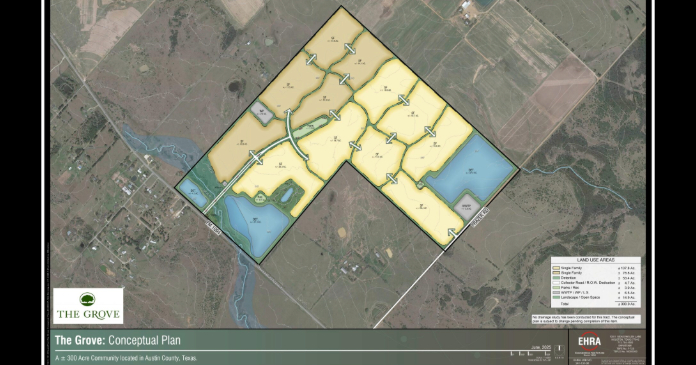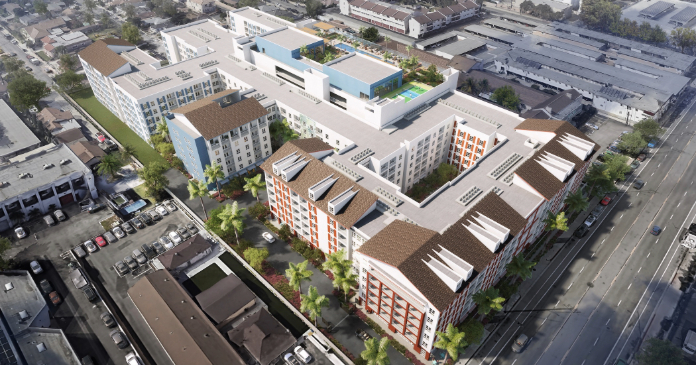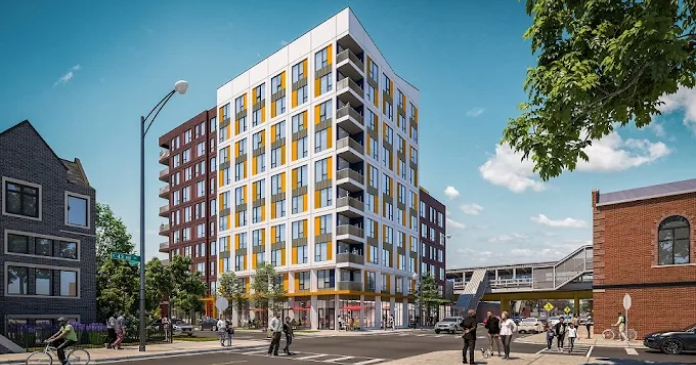Yield PRO TV presents NAHB Power Hitters. Host Linda Hoffman talks with R.J. Pasquesi, President of KCG Companies, LLC.
Transcript: NAHB Power Hitters interview. Linda Hoffman with R.J. Pasquesi, recorded February 24, 2022
(music)
Linda Hoffman: Every generation believes their time to be unprecedented, their challenges beyond anything that came before. Yes. Rulers, environments, economies change. Those things that never change: Truth, human behavior and the need for housing. Through all of time and in all places.
One truth that is often lost to the public: Housing is a responsive sector. We don’t make the policy or the economy, and we don’t create inventory and product at will. No. But we respond. We pivot. We get creative in order to feed market demand and navigate economic conditions. The last year has been one of rapidly changing market conditions and all signs point to even rougher seas ahead. As human behavior is predictable, builders and operators will continue to adapt and create as they have throughout history.
The fundamentals never change: Where rent growth outpaces construction costs, developers will build. With the economy and the world in chaos, we find ourselves in uncharted waters and, again, developers are facing challenges. Case in point: Construction estimates are good for 30 days and many firms are pre-ordering materials up to 9 months in advance… just one example of the inherent risk in today’s business model.
Creative strategy and the flexibility to pivot has made this industry great for decades and today we speak to one of the industry’s great thinkers and pivoters. R.J. Pasquesi, president of KCG Companies headquartered in Indianapolis is here to make sense of it all. RJ, welcome to the show.
R.J. Pasquesi: Well, thank you, Linda. It’s nice to be here.
Linda Hoffman: RJ, what do we need to know about KCG Companies—beginning with—what does KCG stand for?
R.J. Pasquesi: Yeah, I get that a lot, Linda, given that nobody can figure out how that relates to me. So, the back story behind that is, I am not very original when it comes to coming up with creative names. And a friend of mine suggested I use family initials, and so, I decided to use the middle initials of my three daughters. And I thought that was very important for me. And it gave me something to think about every time I say that name, that I’m doing this for those three important people in my life.
Linda Hoffman: Boy, am glad that I asked that. I noticed that KCG Companies is headquartered in Indiana, but doesn’t do a lot of business there. Why is that?
R.J. Pasquesi: Yeah, so, really that came from my prior experience. I did a lot of business outside of the state of Indiana and built a lot of relationships in several different markets. And so, when I started KCG, there were certain markets I knew off the bat that I wanted to focus on. And so, one of those being Texas, the other one Georgia, and the third one Wisconsin… and everyone always asks me, why Wisconsin. And I agree, it’s not a very sexy market, but it’s a very stable and I always really liked working with the state agency there. They were a great group of people, always fair, and so those were kind of the three states that we started in and we just kind of built off that and continue to be able to find opportunities in those markets, as well as other states that we’ve entered into.
But I do expect us, at some point, we are going to do some deals here in my home state of Indiana, so that’ll eventually be on the board. But for now we’ve just been having so much success in some of these other markets—it hasn’t made sense to focus our time or energy here.
Linda Hoffman: You founded KCG Development in 2015. What opportunity did you see that motivated you to go out on your own?
R.J. Pasquesi: Yeah. Well that’s a good question. For me, it’s really, I’ve always wanted to be at the partner level of an organization, and you know, I felt that KCG, going out and doing it on my own was the right way to do that, where I could have the control of how we do business, the control of how we present our products to the market, etc. and that was important to me because I wanted to make sure it was done right, and I felt like the only way to do that was doing it on my own.
Linda Hoffman: KCG Companies has added divisions including design, construction and, most recently, residential property management. Did you plan this or are you responding to opportunity?
R.J. Pasquesi: Well, great question, Linda. So, it was always my vision to build a vertically integrated organization. But we have added certain of the components earlier than I anticipated and that really goes back to what we discussed on the last question of the control factor. We were working with a lot of third-parties and we just weren’t getting the service, the experience, or the outcomes that we expect and that we wanted. And so, bringing that in-house, we felt like we could have more control over it.
And then, right, our vision is building better lives through better communities, and the only way we can truly control how that is happening, in my opinion, is through that control of all of those aspects: construction, management, design, etc. And really for us, that building better lives through better communities is not about the communities we’re building are better than somebody else’s. It’s about us making a positive difference in the lives of everybody we touch along the way.
So, whether that’s local communities, whether that is our financial partners, whether that is subcontractors we work with, whether that’s vendors we work with, and of course, right, the residents that end up living in our communities.
We want to have, make a positive difference in all their lives through their interactions with us and the only way I can see us being able to do that effectively and controlling how that happens is by them always dealing with a KCG representative.
Linda Hoffman: KCG Companies has done several adaptive reuse developments of old brick industrial buildings in New York and Wisconsin. What attracted you to these projects and what challenges did you face?
R.J. Pasquesi: Yeah, so what originally attracted us to those opportunities was one: the ability to combine multiple sources of financing, but also two: right, is the vision of what you could create out of those communities. I mean it’s, they really, if they’re done right they can turn out amazing, and I would say a lot of our projects, the end project looked—they are incredible. They’re absolutely beautiful. I love them. But getting to that point was very painful, so, we unfortunately, in hindsight, didn’t have the experience that we probably needed to and—as a lot of historic developers will tell you—right, they learned the hard way.
And we did it, right. With a lot of unforeseen issues, having to work through the historic process etc. And so, we ran into a lot of cost overruns and cost issues on these projects. But I’m very excited and happy with the end product, but how we got there was more painful than I was hoping for. And because of that, we’ve kind of pivoted over the last couple years to do, focusing almost exclusively on new construction projects now. So, we are doing some acquisition rehabs, but we’re not really touching any historic adaptive reuse projects at this point in time.
Having said that, maybe someday in the future when I look back on some of these communities we’ve done and I’m proud of—I’ll say, yeah, let’s go back and let’s do another one, but for the time being more of our focus is on that new construction side.
Linda Hoffman: Your newest community, The Reserve at Bolton Road, has set aside 20 percent of its units as affordable to residents at or below 40 percent AMI. What’s the secret? How do you make housing affordable to such a low-income level?
R.J. Pasquesi: Yeah. No, we were able to do it on The Reserve at Bolton Road really through two ways. The first being, right, the ability now to do average income for new tax credit projects, so we are able to offset those 40 percent AMI units with units at 80 percent AMI. So, right, that helped us be able to do that. The second reason we were able to do it there was this state tax credit in Georgia, which is a big gap filler. It allows you to do a lot of unique things in that state relative to some other states because you have more sources available to you to target lower income residents. And you can offset that lower income through more tax credits.
Linda Hoffman: You mentioned KCG recently started its first market rate development and it sounds like it’s the way of the future. Why now?
R.J. Pasquesi: Yeah, so when I initially started KCG, the plan was always to diversify into the market rate. But I wanted to establish the organization first in the affordable housing sector and kind of building up our portfolio, building up our experience, etc. And really the opportunity, our first deal, it’s Arco and Pilare, it’s a 350-unit project outside of Austin, Texas. We just found the site and felt like it made a lot of sense from a market-rate perspective. And we’re really excited who we’re partnering with on it and work, and what that community’s going to be at the end of the day.
And going forward our hope is to start trying to develop a couple of market-rate deals a year to complement our affordable housing platform.
Linda Hoffman: Construction is plagued with labor and materials shortages and cost increases for all construction inputs. How has this impacted KCG’s operation?
R.J. Pasquesi: Oh, it is had a huge impact. I mean you talked about in your intro, right, about costs are only valid for 30 days. You know, where people are having to try to place orders nine months out. You’re being told they can’t even tell you the price until the product ships in nine months. It’s a headache. And, right, and so you’re trying to be—come up with creative solutions and call upon your relationships that you have with vendors, with suppliers, with subcontractors, on helping you out, and also helping you read the market, right, of when’s the best time to buy, when is the best time to order supplies, etc.
It, this is unprecedented times, right? And I don’t think anybody in this industry today is ever gone through anything like this. Hopefully we’ll never have to go through it again. But it’s difficult to manage. It’s difficult to manage your budgets. It’s difficult to build your projects on time with the delays and deliveries. You know, we are probably seeing our projects have been delayed—I don’t want to say delayed but—relative to pre-COVID, right, you’re at least added 3 to 5 months to the timeframe to build a community because of the uncertainty in supply, the uncertainty in labor, and then, right, when you see the new cost you’re given—it doesn’t fit your budget. So, then you’re spending months trying to figure out, okay, how do I rework, you know, the materials I’m using to maybe get something that’s closer to my budget number?
So, it’s causing a lot of headaches and I wish there was a magic bullet that someone could give me and the rest the construction industry on how we handle this. But we’re all try to scrape by the best we can right now. But hopefully we’ll start seeing some stabilization here soon, particularly on the price side, and then also the materials.
Linda Hoffman: Well, thanks for a great show, R.J. There’s a lot to learn, especially in this rapidly evolving market. I hope we can have you back.
R.J. Pasquesi: Thank you so much, Linda. I really enjoyed being with you today.
Linda Hoffman: It’s hard to know what history will say once this moment is in the books. Certainly, all actions have consequences and moments such as these form the minds and souls of future builders and entrepreneurs. We can all agree that this chapter will be notable. Freedom and opportunity, truths which fuel the housing business, and the nation, remain at our core, especially through the noise of crisis.
Thank you for being with us today. In this time and this moment, you are what I love most about this remarkable nation. We gratefully acknowledge what you do, and want you to know that we see you and appreciate the hurdles you overcome day in and day out.
I’m Linda Hoffman. Look forward our next exciting episode of NAHB Power Hitters.
(music, closing credits)












